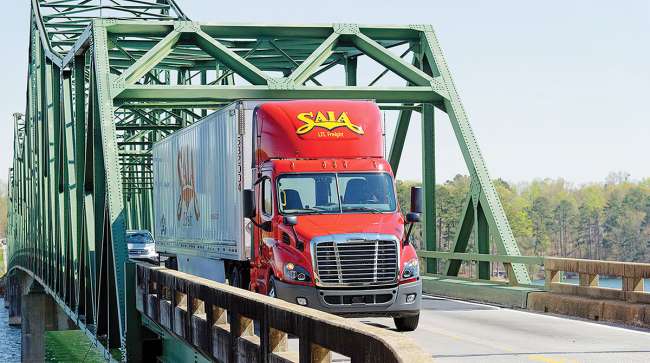Staff Reporter
Technology Is Key in Fleets’ Response to Coronavirus Pandemic

[Ensure you have all the info you need in these unprecedented times. Subscribe now.]
Technology has shaped how trucking companies have navigated through the coronavirus pandemic while setting the resulting economic slowdown apart from past ones.
“When you think about it from a technology standpoint, it’s all about communication and it’s about information,” William Mahoney, senior vice president of sales at NFI, told Transport Topics. “So being diligent and trying to do more with less.”
Trucking companies have made the health and safety of their workers and partners a top priority during the pandemic. Technology has helped in that endeavor by allowing companies to limit interactions.
“Our core value of safety in regard to drivers, dockworkers, office personnel, customers and all essential members of the supply chain has been the primary focus of our technology and process improvements,” Patrick Sugar, vice president of linehaul and industrial engineering at Saia, told TT. “This pandemic has led us to challenge the way we think as an organization.”
Sugar pointed to the integration of a time clock application into the employee portal, which has allowed mobile or remote access. Saia, in Johns Creek, Ga., ranks No. 25 on the Transport Topics Top 100 list of the largest for-hire carriers in North America.
“From employees arriving to the terminal to clocking out at the end of the day, every process has been evaluated and modified in order to reduce face-to-face interaction,” Sugar said. “We have leveraged technology where capable in the short term and have built mid- and long-term technology road maps to create process resiliency.”
Estes Express Lines has made changes such as not requiring delivery appointments and signatures. The company also has kept customers informed of their shipments via text, phone calls and pictures. Estes found customers have embraced the changes.
“It’s important to understand that consumers don’t view the shipment and delivery process any differently from their online shopping experience,” Webb Estes, vice president of process improvement at Estes Express Lines, told TT. “To them, it is one continuous process.” Estes, in Richmond, Va., ranks No. 13 on the for-hire TT100.
United Road Services CEO Mark Anderson sees the pandemic as an opportunity to leverage digital innovations such as touchless delivery and electronic ordering. The Romulus, Mich.-based vehicle transportation service ranks No. 54.
“We will likely return to shortages in capacity and more importantly, continue to utilize technology to drive change in efficiency,” Anderson told TT. “We fully expect an operational recovery. Transportation logistics is the foundation of our country’s network.”
ArcBest shifted a large portion of its workforce to remote work. The company also worked to limit contact during deliveries and better track coronavirus-related data. The Fort Smith, Ark., logistics and trucking company is No. 14 on the for-hire TT100.
Today, we were honored to help the @unitedwayfsa transport hand sanitizer for its free hand sanitizer giveaway! The United Way distributed 6,000 bottles!
Pictured: UW President Eddie Lee Herndon, @ABFtoday driver Donald Jones, UW Resource Development Director Shea Foldvary pic.twitter.com/I9r4BZuhwp — ArcBest (@ArcBestCorp) June 11, 2020
“Externally, we were also able to easily update our signature requirements on deliveries so that customers don’t have to handle driver handheld devices,” Josh Havens, ArcBest’s vice president of corporate communications, told TT. “Internally, we used Microsoft Power BI to create a dashboard that synthesized state/local COVID-19 case data with our service center locations and shipment metrics.”
NFI has utilized technology to better assess the more unpredictable markets that have occurred since the pandemic began. It has had to deal with high demand for essential services while other sectors stalled.
“From a technology perspective, we’re really trying to think about how we can do more with less,” Mahoney said. “How do we maximize the miles and hours that our drivers have to drive, because right now business has slowed down in so many verticals, like automotive.”
Mahoney noted by collecting this data the company hopes to maximize its return on investment. NFI, a third-party supply chain solutions provider and transportation firm in Camden, N.J., is No. 19 on the for-hire TT100.
What does the future for supply chains look like post-virus? Members of our leadership team weigh in with their thoughts: https://t.co/2VC24eIqeq pic.twitter.com/ethkpMZKRs — NFIindustries (@NFIindustries) June 17, 2020
“Our new inbound routing technology has allowed our local teams to remain efficient and match workloads against a highly volatile shipment and tonnage backdrop,” Sugar said. “Looking forward, we have identified several integral technology platforms that will be enhanced.”
Gulf Intermodal Services President Will Connell noted technology has made this downturn and recovery different from previous ones. GIS is an intermodal logistics and warehousing service company that is a part of Memphis, Tenn.-based IMC Cos., which is No. 80 on the for-hire TT100.
“What’s different today than what happened in the Great Recession is the technology is much greater,” Connell said. “So we’re able to leverage the technology that we have in the truck with our internal transportation management system.”
Mike Branch, vice president of data and analytics at Geotab, noted the pandemic and downturn may very well have made technology an even bigger part of industries such as transportation.
“I think people will also be focusing on optimization, tight integration of their commercial vehicles with other lines of business systems,” Branch told TT. “Utilization has been a big thing asked about by a number of our customers.”
Want more news? Listen to today's daily briefing:
Subscribe: Apple Podcasts | Spotify | Amazon Alexa | Google Assistant | More




